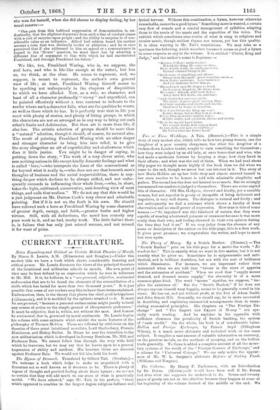CURRENT LITERATURE.
Notes Expository and Critical on Certain British Theories of Morals. By Simon S. Laurie, A.3f. (Edmonston and Douglas.)—Under this modest title we have a book which shows considerable learning and critical power. Mr. Laurie discusses the views of tho principal theorists of the intuitional and utilitarian schools in morals. His own point of view may be best defined by an expression which ho uses in reference to Mr. Mill. It is, he believes, in a "non-personal, suldective, sentimental eudmmonism that are to be found the elements of the reconciliation of a strife which has lasted for more than two thousand years." It is just possible that some of our readers may like to have these terms explained. Eudremonism, then, is the theory that places the chief good in happiness (s5datikos+ia), and it is modified by the epithets attached to it. It must be non-personal, "because a personal eudann onism might justify to itself any course of action on the simple ground of idiosyncratic preference." It must be subjective, that is, within, not without the man. And it must be sentimental, that is, governed by moral sentiments. Mr. Laurie begins his volume with some extracts which exhibit the main features of the philosophy of Thomas Hobbes. These are followed by criticisms on the theories of three great intuitional moralists, Lord Shaftesbury, Francis Hutcheson, and Bishop Butler. In Hume he sees the transition to the new utilitarianism which is developed in Jeremy Bentham, Mr. Mill, and Professor Bain. We cannot follow him through the very wide field which he traverses, but we may say that he loaves upon us a general impression of ability and candour. His heaviest blows are directed against Professor Bain. Wo would not bid him hold his hand.






























 Previous page
Previous page